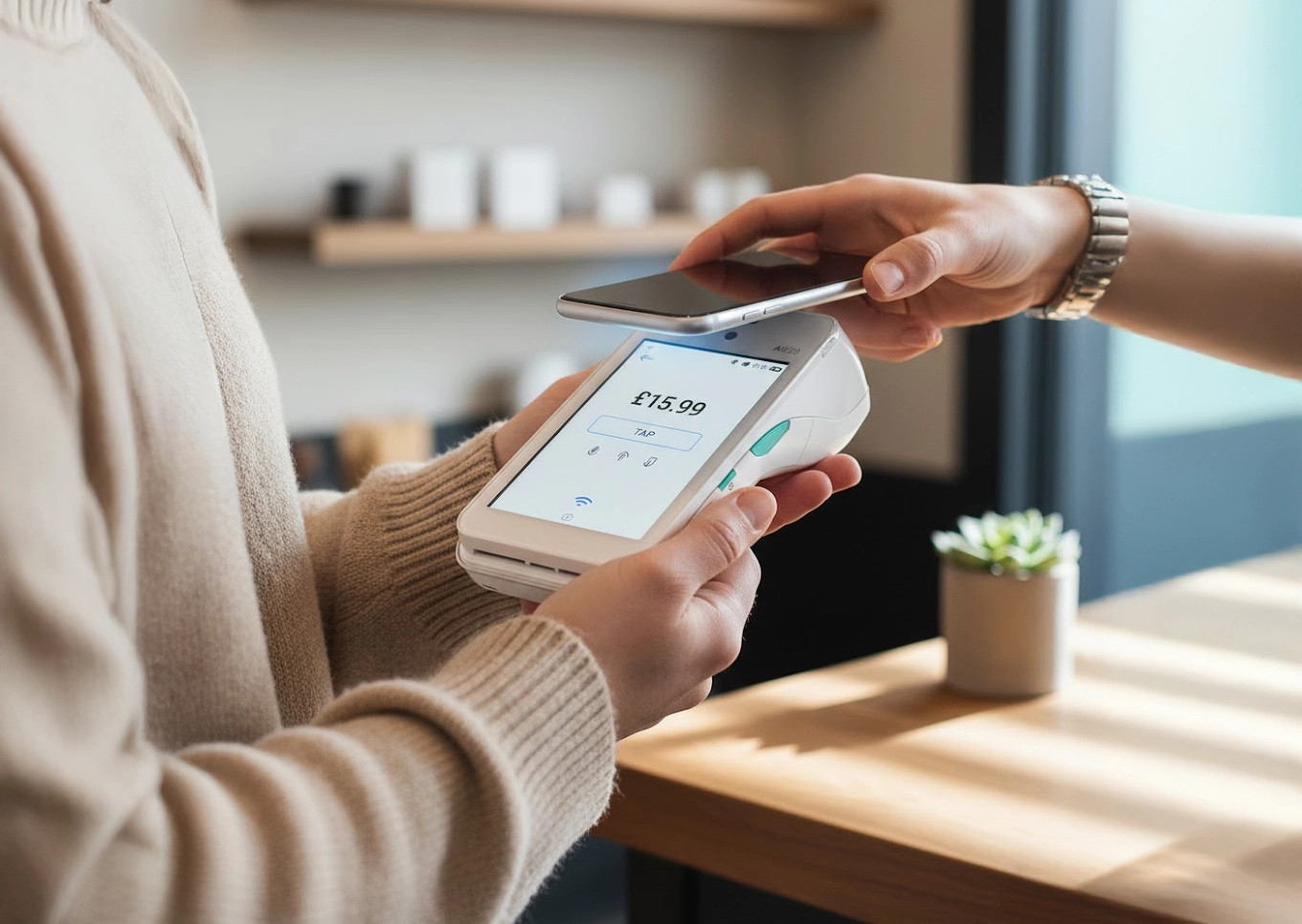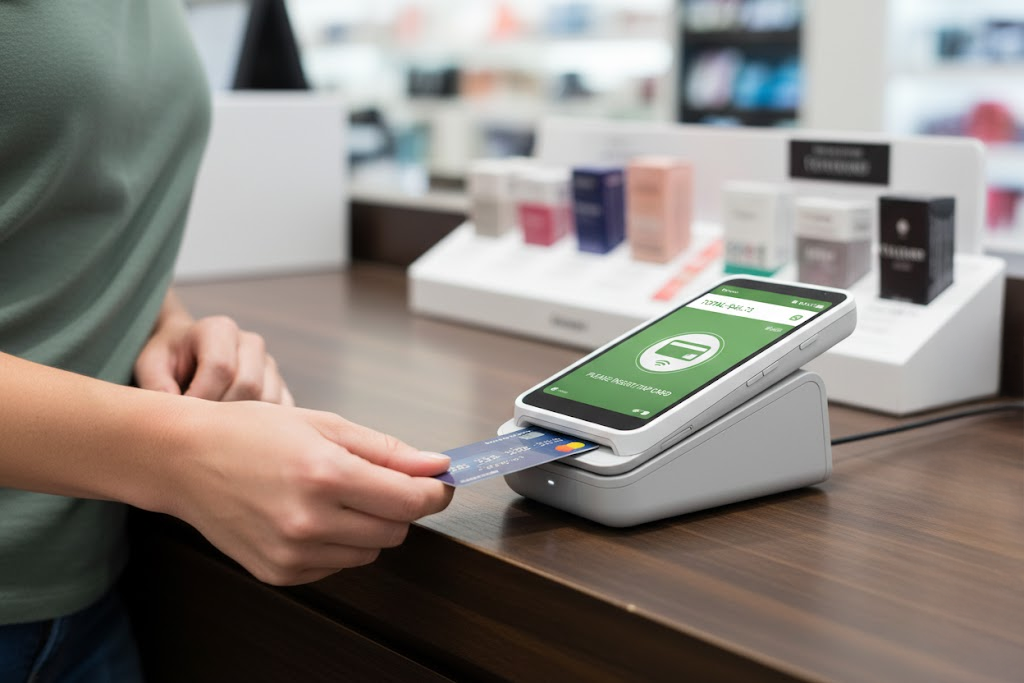
Dojo Card Machine: Independent UK Guide for Businesses
What Is a Dojo Card Machine? A Dojo card machine is a payment terminal supplied as
Get a quote in seconds with our simple form
Last updated 21/01/2026
When a customer makes a purchase, the money goes through a merchant account, which enables businesses to accept credit and debit card payments. They serve as an intermediary between your business bank account and your customers’ bank accounts.
Any business can have a merchant account, and you’ll need one if you want to take digital payments, but some merchant accounts are catered for certain ‘high-risk’ businesses. While they sound like something to avoid, a high-risk merchant account can be handy in ensuring your business doesn’t end up getting frozen or even prevented from being opened in the first place.
Here, we explain exactly what a high-risk merchant account is, how they work, the risks associated with them, and whether your business is likely to need one.
In the world of business, it’s a natural thing that some businesses come with a heightened vulnerability. Such businesses face this vulnerability in many of their day-to-day processes, and it’s no different when it comes to taking credit card payments. This is where high-risk merchant accounts come in.
A high-risk merchant account is a payment processing service that’s specifically catered for businesses that standard merchant accounts tend to consider, you’ve guessed it, too risky to work with. The threshold of acceptable risk, and what actually constitutes risk, varies between payment processors, but the assessment will usually take into account things like your industry, average payment size, and the likelihood of chargebacks.
The million-dollar question when it comes to high-risk merchant accounts. The answer? It depends.
What constitutes risk is up to your payment processor to decide, and there are no official guidelines that clearly define what counts as a high-risk business. What counts as high-risk for one payment processor might not for another. New businesses, for example, have a lack of trading history, which some payment processors would see as added risk; other processors wouldn’t make the same conclusion.
Obviously, the lack of definition can muddy the waters a bit, but there are some agreed-upon factors that can influence how payment processors view your business’s risk level; some of which are listed below:
If the industry your business is in is subject to a lot of regulation, sells regulated products, suffers from a high incidence of fraud, or is otherwise typically volatile to market fluctuations, it will almost certainly be certified as a high-risk business. Examples of high-risk industries include, but are not limited to:
Credit card chargebacks are when a customer disputes a transaction made to your business, usually when they feel they have been wrongfully charged.
One of the most common reasons for someone to start the chargeback process is suspected fraud, so lots of chargebacks often mean lots of fraud, which puts a business in the high-risk category.
It’s a sad truth, but many new businesses fail. This simple fact is itself a reason that some payment processors will classify new businesses as high-risk. Luckily, though, if this is your business, it won’t be high-risk forever.
As you accumulate a large number of successful transactions and can prove profitability, you will become a safer bet for many payment processors.
High-risk merchant accounts do, of course, come with their problems, some of which are broken down below.
High-risk merchant accounts often have higher fees than other merchant accounts. This is because the acquiring bank wants to protect itself against the increased risk of problems occurring during the transaction process.
Businesses with a high-risk merchant account often face stricter terms and conditions, including frequent account reviews, hefty termination fees, and longer settlement periods.
There may also be a requirement for your business to have what’s called a rolling reserve. This is a deposit held by your merchant account provider, typically 5-20% of your monthly transactions. They make it easier for acquiring banks to shelter themselves from the increased risk of chargebacks.
While this article focuses on high-risk merchant accounts, we also have in-depth guides that fully explain all you need to know about taking payments. Explore below:
Even given the above, standard merchant accounts aren’t always the better option. Standard merchant accounts, for example, won’t expect anything out of the ordinary. So if a business starts making more frequent and larger transactions or experiences an influx of refund requests, the merchant account could be frozen. This would be typical of a high-risk account, so the chances of such an account being frozen are reduced.
So you see, despite their name, high-risk merchant accounts do have some benefits over other merchant accounts and, if you do operate in a high-risk industry, having a high-risk merchant account to match is highly advisable.
If you think your business could do with a high-risk merchant account, there a several options out there.
Providers like Worldpay and PayPal offer the kind of thing you’re looking for. In fact, the team here at Commercial Experts have written a review on them both, so you can take a deeper dive into each one of them should you choose to. PayPal’s card machines have also featured on our best card machines round-up, so it would be a great choice of high-risk merchant account if you have a physical shop.
Alternatively, you can compare merchant accounts today by filling in our quick form. Click the button on this page to get started with that, and we’ll match you up with a suitable provider.
If you fall into the category of a high-risk merchant, you’ll need a high-risk merchant account.
Yes, they typically come with higher fees, stricter terms, and the need to have a rolling reserve, but they help you out in the long run by offering able to offer your customers a digital way to pay without the risk of having your merchant account frozen.
In short, if you do operate in a high-risk industry, having a high-risk merchant account to match is highly advisable and could prove highly profitable, despite the drawbacks they tend to come with.
High-risk merchant accounts are offered to businesses that operate in a way that payment processors deem as high-risk. This could be because of their industry, the way their customers tend to pay, or the size of a typical transaction.
They work broadly the same as every other merchant account but involve typically higher fees or extra checks.
Businesses are high risk when there is a higher likelihood of exposure to operational or regulatory risk. It’s not just your industry and credit score that can affect whether your business is deemed to be high risk. Other factors include:

What Is a Dojo Card Machine? A Dojo card machine is a payment terminal supplied as

What Are Stripe Payments? Stripe Payments is a payment processing service provided by Stripe that allows

Your business needs a card machine that’s suited to you and your customers: here’s our breakdown




CommercialExperts.com helps savvy UK businesses to save time and money by comparing a wide range of essential products and services.
© TFLI 2025 All rights reserved. Licenced by the Information Commissioners Office, (Registration Number Z3585914) Registered in the UK, number 08424810. Registered Office Address: First Floor, Beechwood Court, Springwood Way, Tytherington Business Park, Macclesfield, Cheshire. SK10 2XG.